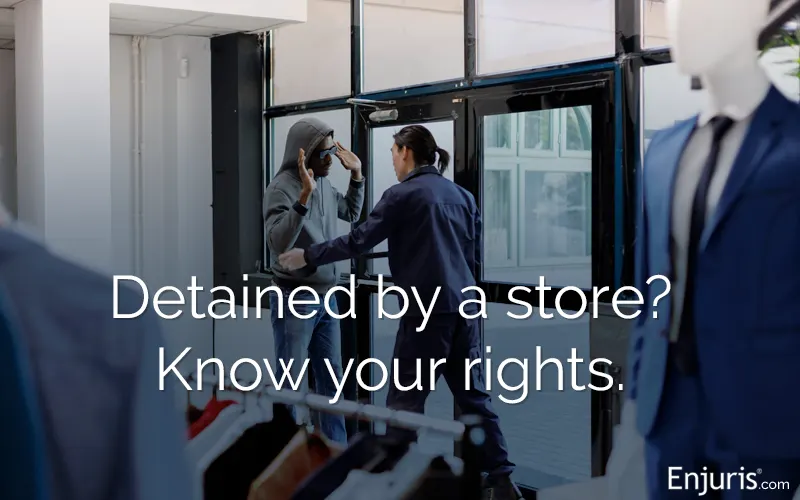
You’re in a busy jewelry store, browsing through some items. Suddenly, you’re approached by the shopkeeper who suspects you of shoplifting. You’re asked to step into their office for questioning.
This situation raises an important question: Can a shopkeeper legally detain you based on suspicion?
This article explores the “shopkeeper’s privilege,” a legal principle that permits store owners to detain individuals they suspect of theft under certain conditions. We’ll explore the rights and limitations of shopkeepers under this privilege, and also discuss what legal options exist for customers who are wrongly detained.
What is the shopkeeper’s privilege?
The shopkeeper’s privilege is a legal concept that allows shopkeepers to detain individuals they reasonably suspect of shoplifting.
The doctrine recognizes the unique position of store owners who need to decide whether to absorb a loss by turning a blind eye to a suspected shoplifter or apprehend the suspect and risk a lawsuit if the shopkeeper’s reasonable suspicions turn out to be erroneous.
What are the limitations of the shopkeeper’s privilege?
The right to detain an individual under the shopkeeper’s privilege is not absolute. There are three criteria a shopkeeper must adhere to:
- A shopkeeper must have a reasonable basis for suspicion before detaining the suspect,
- The detention must not exceed a reasonable amount of time, and
- The detention must be conducted in a reasonable manner.
Actions that exceed these boundaries, such as the use of excessive force, subjecting the individual to public embarrassment, or detaining the individual for an excessively long period, are not protected under the shopkeeper’s privilege and could lead to legal consequences for the shopkeeper.
Notably, courts are reluctant to state precisely what constitutes a reasonable amount of time for detention, but it’s generally considered to be the amount of time it takes to investigate the suspect and determine whether they have committed a crime.
To illustrate these principles, let’s consider two contrasting hypothetical scenarios:
Hypothetical one: proper exercise of the shopkeeper’s privilege
A shopkeeper observes an individual in a clothing store who seems to conceal a shirt under their jacket. Suspecting shoplifting, the shopkeeper discreetly approaches the individual and politely invites them to a private office. There, the shopkeeper inquires about the shirt. The individual reveals a bulky medical device under their jacket, which had inadvertently lifted the shirt, creating the false impression of theft. Realizing the misunderstanding, the shopkeeper apologizes, and the individual is promptly allowed to leave.
This example shows a reasonable exercise of the shopkeeper's privilege, where suspicion is addressed in a private, respectful manner, quickly resolving the confusion without embarrassment or unnecessary delay.
Hypothetical two: improper exercise of the shopkeeper’s privilege
A shopkeeper, influenced by personal biases, develops a vague suspicion towards a customer based on the customer's race. Without observing any actual suspicious behavior or evidence of shoplifting, the shopkeeper confronts the customer in the store's public area, accusing them of theft. The customer is detained forcefully and held for an extended period, causing public embarrassment and distress.
This approach is a clear misuse of the shopkeeper's privilege. The suspicion is not based on reasonable grounds but rather on discriminatory profiling. The public and forceful manner of detention and the prolonged duration of the hold are excessive and legally indefensible. Such actions not only breach the ethical application of the shopkeeper's privilege but also expose the shopkeeper to legal consequences.
Navigating the shopkeeper’s privilege
For shopkeepers, it’s important to train your staff on the legal limitations of the shopkeeper’s privilege. Implementing clear policies and procedures for handling suspected shoplifting incidents can prevent overstepping legal limitations.
For individuals, if you believe you’re being wrongfully detained, stay calm and avoid escalating the situation. Gather information, such as the names of the shopkeeper and witnesses, and document your version of events as soon as possible. Seeking legal advice from an experienced attorney is an important step in understanding your rights and options for legal recourse.
To safeguard against false imprisonment claims, a shopkeeper may request that a detained individual sign a voluntary waiver. However, it's crucial to understand that signing this waiver is entirely voluntary. The shopkeeper is not legally permitted to coerce or mislead the suspect into believing that signing the waiver is a condition for being allowed to leave the premises.
Pursuing legal recourse for improper detention
As a victim of improper detention under the shopkeeper’s privilege, you have the right to seek legal action against the retailer or business owner responsible. If you’ve been wrongfully detained, you may consider filing a lawsuit against the store or a specific employee.
The most common cause of action is false imprisonment. False imprisonment occurs when an individual is restrained or confined without legal authority. In the context of the shopkeeper’s privilege, if a shopkeeper detains someone without reasonable suspicion or holds them for an excessive duration, it can lead to a false imprisonment claim. This is a serious accusation and can result in legal repercussions for the shopkeeper, including compensation claims for any injury or distress caused.
Other causes of action that may be appropriate include:
- Assault and battery: In cases where the detainee experiences physical harm or is threatened with violence during their detention, they may have a valid basis to file a lawsuit for assault and/or battery.
- Intentional infliction of emotional distress: If the detention was executed in an excessively outrageous way or resulted in significant emotional trauma, the individual could pursue a claim for intentional infliction of emotional distress.
- Defamation: If the store or its employees made untrue statements about the individual that damaged their reputation, there could be grounds for a defamation lawsuit. This includes situations where the detainee is falsely labeled or accused of shoplifting or other criminal behavior in a manner that negatively affects their public image or standing.
